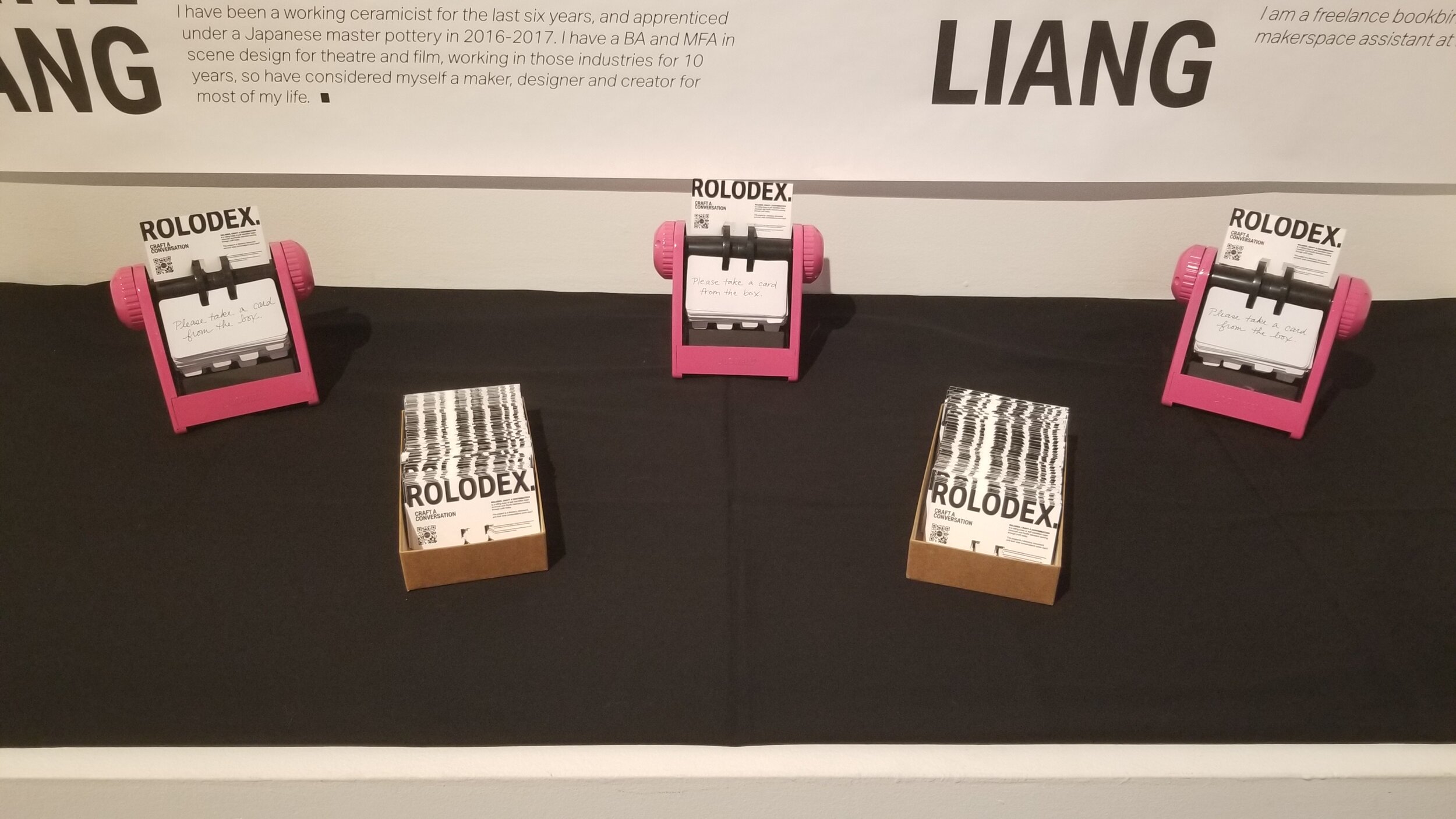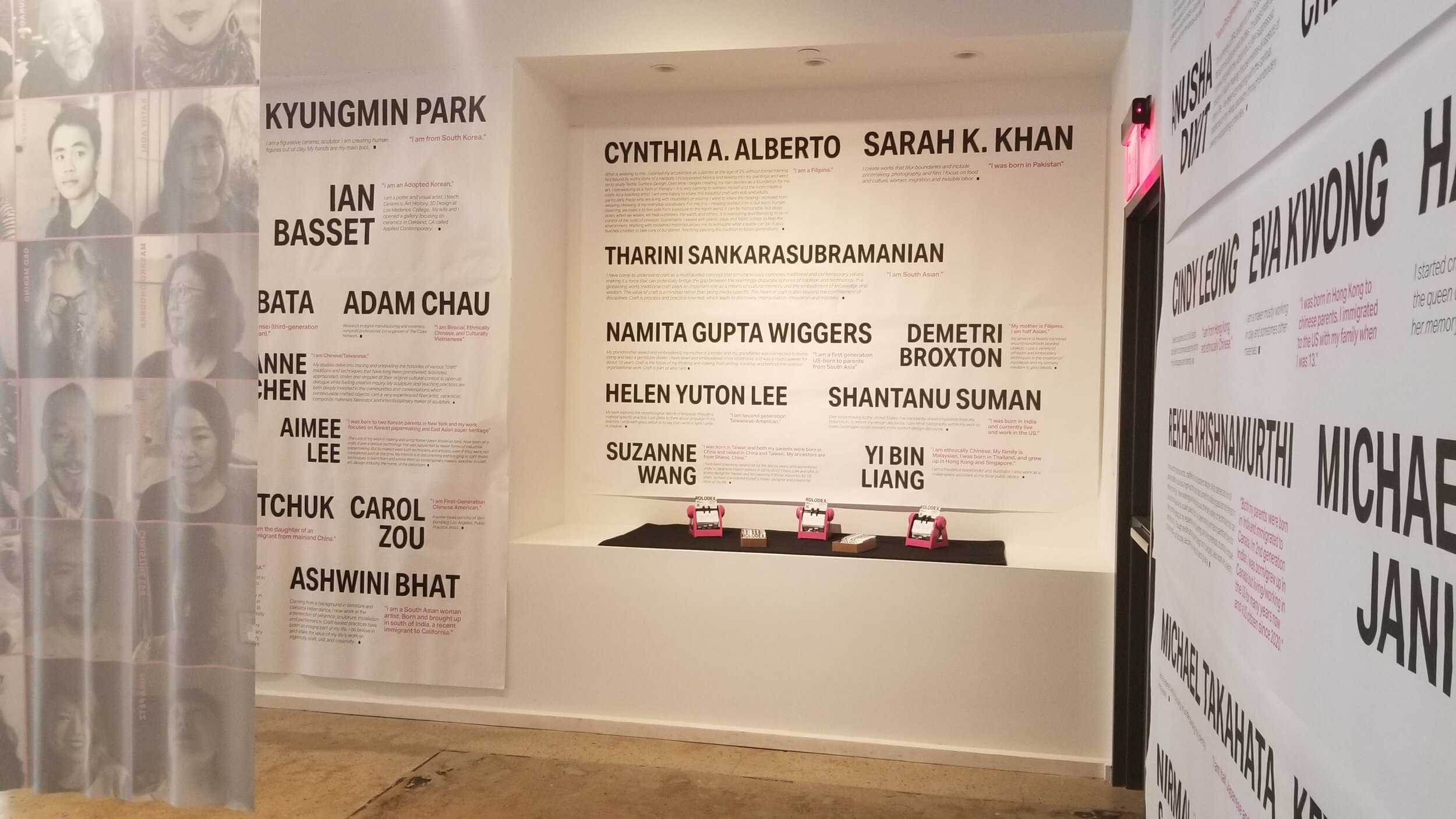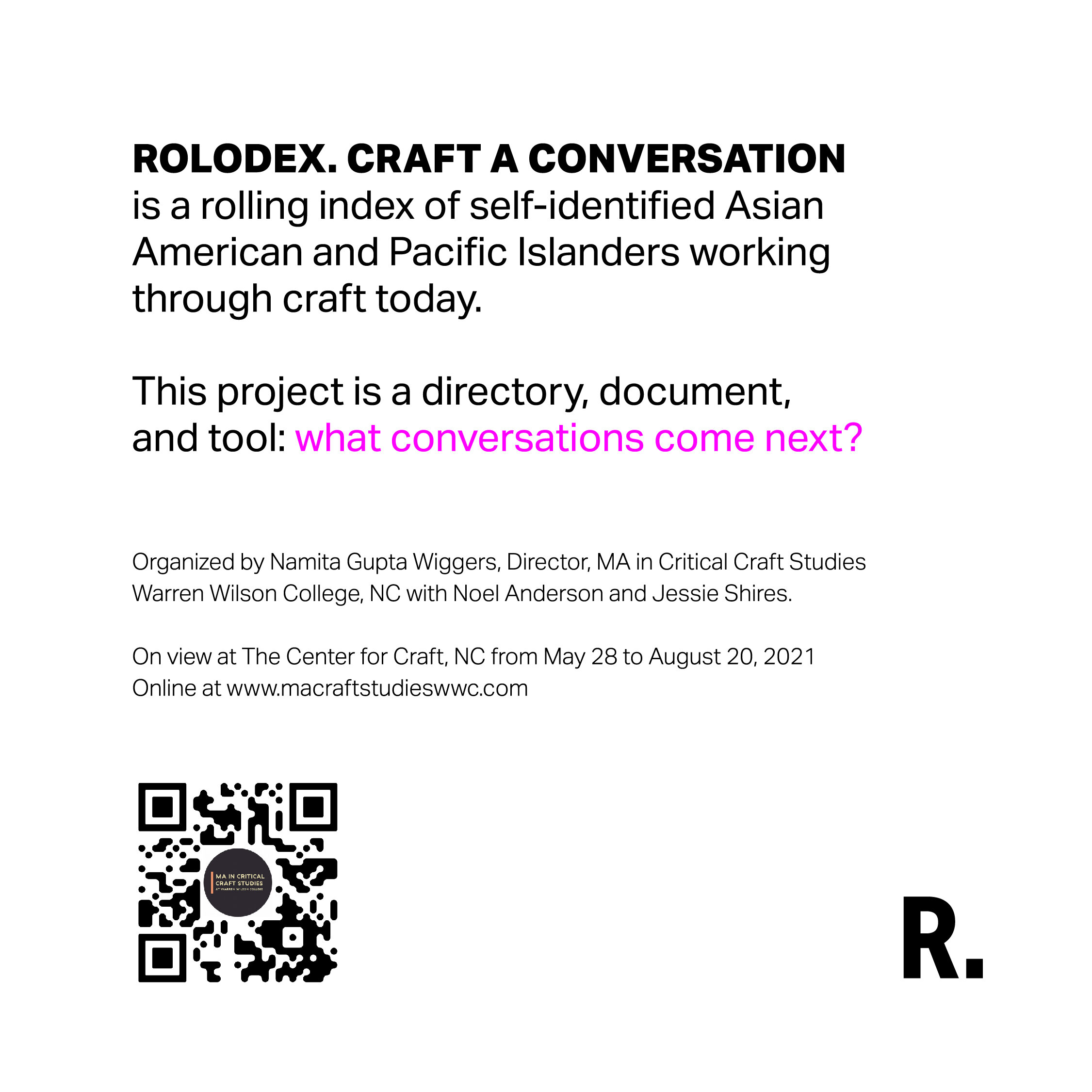
ROLODEX: CRAFT A CONVERSATION is a rolling index of self-identified Asian American and Pacific Islanders working through craft today. Starting with 200 people, ROLODEX will continue to gather listings from our AAPI community until August 1, 2021. This project is a directory and a tool: what conversations come next? How does research catalyze community, action, and visibility?
Why focus on Asian American and Pacific Islanders working through craft?
According to the Pew Research Center, Asian Americans are one of the fastest growing groups in the US since 2000. Despite nearly 23 million Asian American in the US population, a recent study by Leading Asian Americans to Unite for Change (LAAUNCH) found that 58% of their respondents could not name a prominent Asian American (Hint: Vice President Kamala Harris).
Drawing inspiration from the Black Power Movement, students at the University of California, Berkeley are credited with unifying pan-Asian groups under the term “Asian American” in the 1960s. This grouping deliberately rejected the outdated, geographically-based, and problematic term “Oriental.”
In the 1980s, the U.S. Census expanded the category, combining Asian American and Pacific Islanders. Today, this governmentally-determined grouping feels too broad to many, as it includes more than 20 countries and thousands of Pacific Islands, each with unique histories, cultures, languages, and craft histories.
Exhibitions catalyze conversations. This is a conversation starter to bring people of AAPI heritage together. If you are working through craft and of AAPI heritage, add your information. Take a picture of the QR code or a rolodex card to access the directory.
Talk with us to understand who we are, what we make, and how we shape American Craft.
ROLODEX. Craft a Conversation was on display at the Center for Craft from June 4 - August 20, 2021. Our related project, the AAPI Craft Directory, launched simultaneously and remains ongoing. Learn more here.
Organized by Namita Gupta Wiggers, Director, MA in Critical Craft Studies, Warren Wilson College with Noel Anderson and Jessie Shires. This exhibition is part of an ongoing relationship with The Center for Craft, founding program partner for the MA in Critical Craft Studies program.
Special thanks to Noel Anderson, Kate Bingaman-Burt, Sarah Darro, Anjali Gupta, Rahul Gupta, Ayumi Horie, Sarah K. Khan, Laura Kina, Phoebe Kuo, Helen Lee, Ben Lignel, PJ Gubatina Policarpio, Jessie Shires, Aram Han Sifuentes, Shantanu Suman, Stephanie Syjuco, Angelik Vizcarrondo-Laboy, Leila K. Wiggers, Marilyn Zapf, and all current and future participants in the project for discussions and research assistance to develop this project.
Exhibition Photos &
Program Recordings









Program:
Crafting Foodscapes with AAPI Communities
Asian American and Pacific Islanders offer much to our unique North American Foodscapes. On August 18, 2021, a group of dynamic artists, makers, activists, cooks and healers, with richly layered identities — Sara Khurshid Khan, Linda Black Elk, Sunhui Chang, Ellen Sebastian Chang, and Genevieve Erin O’Brien — came together to discuss how they navigate craft through the vibrant lenses of food and culture.
Sarah Khurshid Khan is a maker and scholar of Pakistani descent. Before the discipline of food studies formally existed, she cobbled together an undergraduate degree in Middle Eastern history and Arabic, as well as several graduate degrees in public health, nutrition and plant sciences. She has since pivoted and is a maker of prints, photos and doc films. She has received numerous grants, residencies, and fellowships to pursue writing, research, and multimedia expressions on food, culture, women migration, and healing. She has presented her multimedia creations at Museum of the Moving Image, Queens Museum, and New York University, to name a few. @sarahkkhan http://sarahkkhan.com/
Sunhui Chang was born in Korea and grew up on the island of Guam, where he fell in love with the movies at weekly double features—and with food in the kitchen of his mother's restaurant. He started writing while studying Sociology at UC Berkeley. After the university, he focused on his passion for food and the culinary arts, as a journeyman cook. He then started his own boutique catering business, and later became the Chef and Owner of an award-winning restaurant—FuseBOX—in Oakland, CA. He was also the Media and Communications Strategist for University of California’s Immigrant Legal Services Center, which provided immigrant legal services to all students and their families. He is now focusing on his writing and film making.
How to Fall in Love in a Brothel is his first film. It is a short excerpt from a longer script for a miniseries that tells the story of a Korean family's immigration to Guam. Currently, the short film has been selected and won awards on the film festival circuit. He has also written "the estate" and "the boiling" which were recently read by Campo Santo Theater. He is working on the production of "the estate" along with the second installment of a planned three-part short film series based on excerpts from How to Fall in Love in a Brothel.
Genevieve Erin O’Brien is a Queer Vietnamese/Irish/German artist with 20+ years as a community organizer, trainer, cultural producer and chef. O’Brien holds an MFA in Performance from the School of the Art Institute of Chicago and was a Fulbright Fellow to Vietnam in 2009. O’Brien has been a frequent lecturer in Asian American Studies. Their short film For The Love of Unicorns has screened internationally. O'Brien received the Department of Cultural Affairs, City of Los Angeles’ Creative Economic Development Fund in 2015 & 2016. As a US Dept. of State/ZERO1 American Arts Incubator Artist, O’Brien traveled to Hanoi to develop a digital media project highlighting LGBTQ visibility and equality in 2016. Recent works More Than Love on the Horizon andSugar Rebels were commissioned by the Smithsonian Asian Pacific American Center. The Critical Refugees Studies Collective of the University of California recently funded O’Brien’s current performance series Refugee Resistance Menu. O’Brien, once a butcher’s apprentice, is also a private chef and chef/owner of sausage enterprise Meat My Friends (www.eatmeatmyfriends.com). www.erin-obrien.com
Linda Black Elk is an ethnobotanist and food sovereignty activist specializing in teaching about culturally important plants and their uses as food and medicine. Linda works to build ways of thinking that will promote and protect food sovereignty, traditional plant knowledge, and environmental quality as an extension of the fight against hydraulic fracturing and the fossil fuels industry. Linda and her family have been spearheading a grassroots effort to provide organic, traditional, shelf stable food and traditional Indigenous medicines to elders and others in need. Linda has written for numerous publications, and is the author of “Watoto Unyutapi”, a field guide to edible wild plants of the Dakota people. Linda spends her time foraging, hiking, hunting, and fishing on the prairie with her husband and three sons, who are all members of the Oceti Sakowin. Linda currently serves as the Food Sovereignty Coordinator at United Tribes Technical College in Bismarck, North Dakota. @lindablackelk
Ellen Sebastian Chang is a creator in the performing arts, as a producer, director and arts educator whose career spans 45 years. Her current projects include an ongoing collaboration with AfroFuturist Conjure artist Amara Tabor Smith and the Deep Waters Dance company’s House/Full of BlackWomen, a multi-year site-specific dance theater work that addresses the displacement, sex trafficking, and the creative well-being of Black women and girls in Oakland, California. She has worked as an arts educator for 42 years: with technical direction/design classes at the Urban School of San Francisco, Magic Theaters Young California Writer’s Program, as an artist in Bay Area Public Schools via Young Audiences of Northern California and for the past 14 years with The World as it Could Be Human Rights Education Arts Program. Sebastian Chang was the cofounder and artistic director of Life on the Water, a national and internationally known presenting and producing organization at San Francisco’s Fort Mason Center from 1986 through 1995. In the past five years she has collaborated with the HBO production "Whoopi Goldberg Presents Moms Mabley"; Maya Gurantz "A Hole in Space (Oakland Redux)"; Sunhui Chang and Maya Gurantz "How to Fall in Love in A Brothel”; Campo Santo and Ben Fisher’s “Candlestick” and served as the proud co-owner and general manager of FuseBOX Restaurant, created by chef Sunhui Chang in West Oakland, California. The short film "How to Fall in Love in A Brothel” is currently showing in festivals in USA, Canada and Europe. She is a recipient of awards and grants from Creative Capital, MAP Fund, A Blade of Grass Fellowship in Social Engagement, Art Matters, Kenneth Rainin Foundation, NEA, Creative Work Fund, California Arts Council, Mazza Foundation and Zellerbach Community Arts Fund.
Program: Let’s Gather and Talk!
Namita Gupta Wiggers, director of Warren Wilson College's MA in Critical Craft Studies program and curator of ROLODEX. Craft a Conversation, and Sarah Darro, Gallery Manager at the Center for Craft, led a virtual walkthrough of ROLODEX on July 12, 2021.
Explore the ongoing AAPI Craft Directory project.
The directory was introduced as part of our exhibition, ROLODEX. Craft a Conversation, which was on display at the Center for Craft from June 4 - August 20, 2021. Though that exhibition has closed, the directory continues to build.
We want this project to catalyze conversations. This directory is intended to be a conversation starter to bring people of AAPI heritage together.
If you are working through craft and of AAPI heritage, we hope you’ll add your information.
If you are a craft researcher, please consider this directory a tool for making connections. Instead of reading about us, talk directly with us to understand who we are, what we make, and how we shape American Craft.